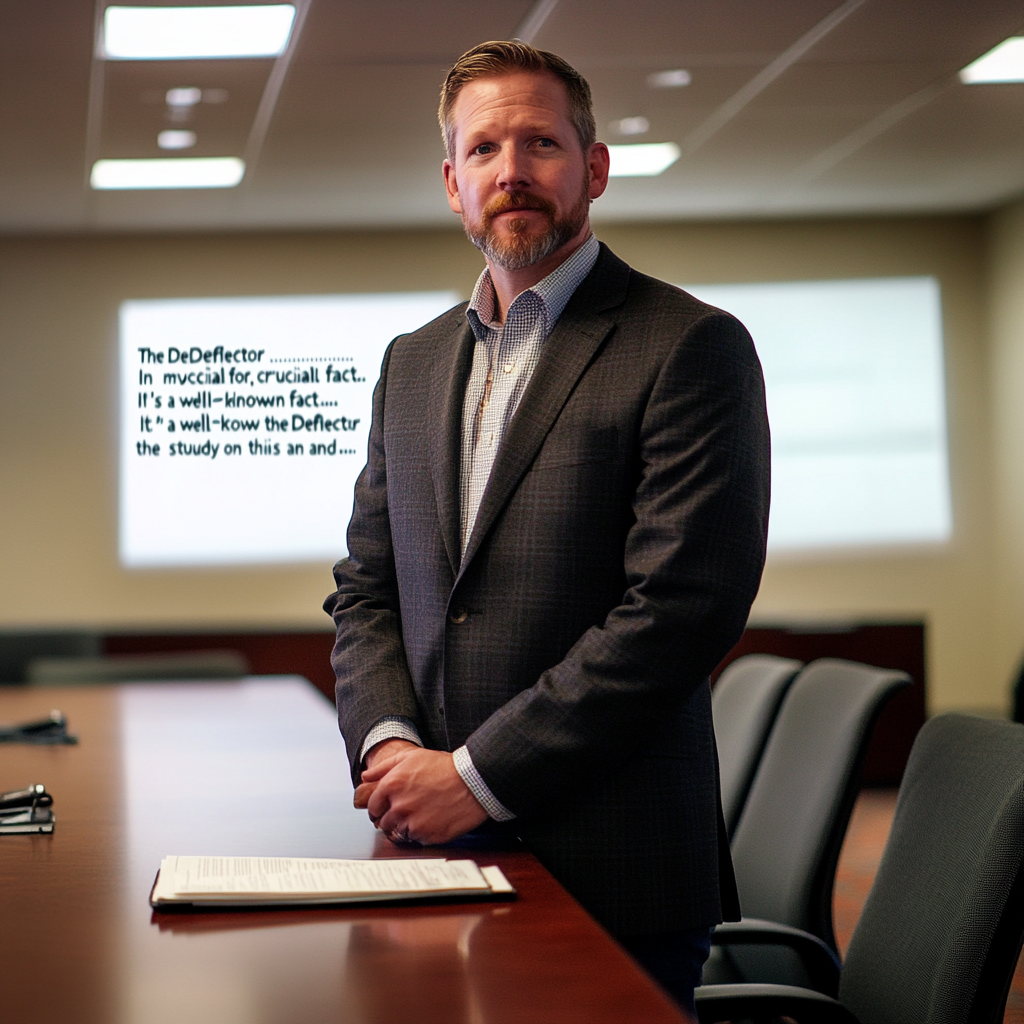This article is a story about a couple of characters that I have completely made up for the purpose of demonstrating a rhetorical interplay between people that happens quite often. Have you ever been in a situation where someone throws out a fact that no one has the ability to check in order to discredit you? This is actually quite common. People refer to a data source, like they might an authority figure, and quote it without considering the quality, relevance, or interpretation of that data. You need not look very hard. For example, look at any social platform, and you will find threads full of people having arguments by appealing to data, or what I like to call Dataism. To illustrate this attempt at undermining using an appeal to data and a possible refutation, I will introduce two characters. Dr. Evelyn “Eve” McMillan and Nick “The Deflector” Hastings.
Nick Hastings, often known as “The Deflector,” has been in the corporate world for over a decade. He prides himself on his ability to steer conversations in meetings with what he calls “crucial facts,” though they often lack substance. Nick is overconfident, verbose, sly, and deep down insecure. He is worried about being exposed, so he masks this insecurity by always using a barrage of pseudo-facts in conversations. You might hear him say things like, “In my extensive experience…” or “It’s a well-known fact that…” in order to derail conversations with off-topic facts that sound convincing but are usually irrelevant. He often times wears a suit that is a bit too flashy for the situation and always carries around a giant notebook that looks like it is full of important things, but you have never seen him open it. Employees in the company have started calling him “the Deflector” because he can dodge a direct question better than anybody. Nick does not know this, but when on a conference call, people joke around on a chat message, calling out phrases that he always uses, such as “they did a study on this and…” In our scenario, Nick is the Senior Strategy Analyst for InnovateX Corp, a leading digital solutions enterprise.
Dr. Evelyn McMillan, or “Eve” as she prefers to be called, brings over 20 years of experience in data science, analytics, and IT strategy. She holds a Ph.D. in Data Science from Stanford University and has held senior positions at several Fortune 500 companies, where she spearheaded transformative data initiatives. Her expertise spans various industries, including finance, healthcare, and technology. She is a recent hire, filling the role of Chief Data Officer (CDO) at InnovateX Corp. This is a new position created by the CEO and the board to answer the growing need for data management and governance within the company. Eve is a visionary with a clear vision for the company’s future. She believes in the power of teamwork, as long as she is in control of the details. She is extremely meticulous and prides herself on being able to make tough decisions quickly because of her preparation. She is constantly sending reports in to the CEO and board with her progress and challenges and seems transparent in her communications with other team members. She is good at explaining complex things in a way that helps others understand the importance and potential of harnessing data within the company. If you have not guessed, she is the hero of our story.
During a board meeting at InnovateX Corp, the team discusses the effectiveness of a new marketing strategy. As the Chief Data Officer, Eve presents data showing a 20% increase in web traffic over the past quarter that she has been able to start demonstrating using a data management platform that her team built. Her goal is to show the power of data and how that can be instrumental in making better decisions about where the company invests. Nick can barely contain himself; after all, up to this point, he has been the primary go-to person for strategic analysis. Nick, who is sitting at the back end of the board room conference table, says, “Well, according to research I’ve read, web traffic increases are often just a seasonal trend. I believe the real metric we should be looking at is our social media engagement. It’s a well-known fact that increased web traffic doesn’t necessarily correlate with higher sales.”
Eve, prepared for such an undermining attempt, calmly responds: “That’s a valid point, Nick. However, our data analysis also includes a breakdown of conversion rates and customer acquisition costs, which show a significant improvement in conjunction with the increase in web traffic. Additionally, we have corroborated this data with industry benchmarks to ensure its relevance and accuracy. Would you like to review some of those benchmarks with me? I believe you were the one who recommended that the company invest in that subscription?”
In this conversation, Nick is trying to use a rhetorical dart to deflate any credibility that Eve brought into the meeting quickly. Nick is probably smart enough to know that her use of detailed reporting and updates to the board has only increased her status as the person who has the right answers. This is an undermining attempt. Any new person in a company, especially a CDO, had better be ready for these rhetorical attacks. This type of role is a threat to established roles and can often be construed as a threat to the way and manner in which people make decisions. These attacks will happen frequently at first, but if handled well, they will die off quickly. Eve’s response was the correct way to handle this by providing a solid refutation but also with just enough of a threat of potential entanglement that an ill prepared person like Nick will retreat from quickly. Notice how Eve provides him with an easy way out and includes a signpost.
Nick, realizing he has been defeated, responds, “Yes, Eve, that’s exactly why I pushed for that subscription. I’m glad to see it’s being put to good use. Let’s definitely review those benchmarks together to ensure we’re all aligned on our strategy.”
Notice what happens here. Nick has been put in his place with the data that Eve provided. Nick’s claim on some data sources was easily swatted away with a little preparation. His only way out is to save face, and by so doing, he has established that Eve is the team player, and now he must work with her next time so that his assumptions can be validated first. This will always thwart a character like Nick because he is insecure and will only try to make an argument after his first attempt at a bluff using data he knows about. There is an important point here. By using detailed, well-prepared data, Eve effectively counters Nick’s attempt to derail the conversation and keeps the focus on the comprehensive analysis that supports the new marketing strategy.
Eve was required to think on her feet, yes, but more importantly, Eve knew the data behind her presentation well and had supporting ideas to back them up. She was prepared. One I was young, I got to go with my Grandfather to a court case that he was on. He told me as he pulled a manilla folder full of documents out of his briefcase that the secret to being a good trial lawyer was not in thinking on your feet. That certainly helps, but the secret was to be the most prepared person in the room. The most prepared. That is a lesson in how Eve addressed this attempt to undermine her.
We all have to deal with the Nick Hastings of the world, more often than not, it seems. Some of us may be acting like Nick on occasion. I think it is important to consider these scenarios and how we could and should respond so that when they happen, those will be pivotal moments for us in our careers.




